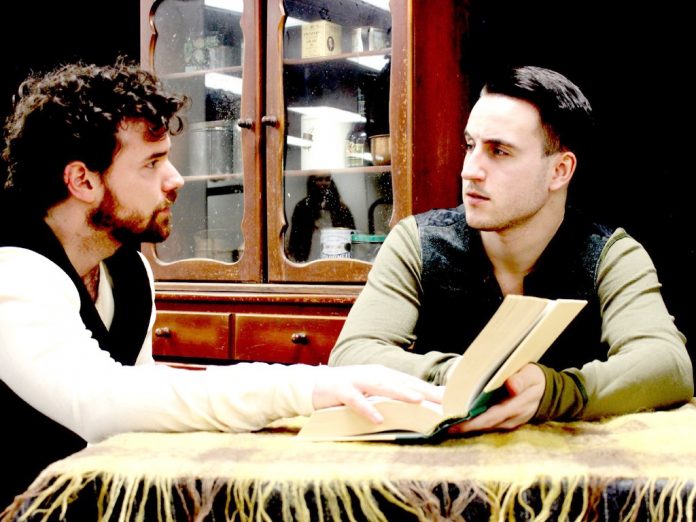Showtime: Sean O’Casey’s The Shadow of a Gunman will be on stage April 9 through 25 in the Skybox at the Adrienne, 2030 Sansom St. PHOTO COURTESY OF THE Skybox at the Adrienne
The folklore of armed revolution can seem thrilling, romantic and even inspiring to future generations. But the working-class folks stuck amid the chaos often have a different point of view, one in which the lofty ideals of nationalism and freedom become obscured by pain and poverty, suffering and stray bullets.
And if you’re an early 20th-century Irish playwright like Sean O’Casey, the narrative will include a healthy dose of black comedy, too.
That literary technique is by no means unique among O’Casey’s countrymen. In fact, juxtaposing laughs with the macabre is standard practice in classic Irish drama, according to senior members of Philadelphia’s Irish Heritage Theatre.
“The Irish plays have certain things in common. There’s a certain humor, a darker sense of humor. Another thing is they certainly don’t believe in happy endings,” said Kirsten Quinn, a theater professor at Community College of Philadelphia and an IHT board member.
“They find comedy in the most tragic circumstances,” agreed Armen Pandola, an award-winning playwright and producer of IHT’s new staging of O’Casey’s The Shadow of a Gunman, which will show from April 9 through 25 in the Skybox at the Adrienne, 2030 Sansom St.
Gunman is the first of three O’Casey plays that the company will produce over the next year leading up to the centennial of the 1916 Easter Rising. O’Casey’s famed trilogy also includes Juno and the Paycock and The Plough and the Stars.
There are multiple Northeast Philadelphia connections at IHT. Quinn, who serves as its board secretary and director of publicity, grew up in Rhawnhurst and graduated from St. Hubert’s High School. Oxford Circle native and Father Judge grad Jimmy Guckin is part of the ensemble cast in Gunman.
Set inside a tenement apartment in 1920 Dublin during the height of the Irish War of Independence, Gunman is O’Casey’s study of two young men, a street vendor named Seamus (Kevin Rodden) and a poet named Donal (Dexter Anderson), whom neighbors mistake as a “volunteer” in the secretive revolutionary force known as the Irish Republican Army.
Donal plays along with the misunderstanding as it garners him reverence from other tenement dwellers and wins him the romantic affections of an attractive woman who also lives in the building. Soon, circumstances bring a premature halt to the budding romance and the entire charade.
“The play has a profound tone of how people behave in crises and how they behave during political and social upheaval,” director Peggy Mecham said.
While the characters’ frustration and despair is never too far from the surface, there are plenty of funny moments, too. Guckin, as Tommy Owens, provides many of them. The character is an idealistic and naive young man who wants to join the volunteers and who seeks Donal’s help in doing it. Donal advises Tommy that the IRA will seek him out when he’s needed.
“It’s definitely more comedic and baffoonish (as a role),” Guckin said. “I find it easy to play that.”
Though his lines are few compared to the two main characters, who appear in virtually every scene of the two-act play, Guckin has worked hard to develop his role, adding texture to the part even without speaking. Senior members of the IHT agreed that they have been gaining a new appreciation for O’Casey’s script though the arduous theatrical process.
“Every time I’m at rehearsals, I’m learning new things about O’Casey,” Pandola said. “O’Casey doesn’t really take a position (politically). But he’s saying that this idea of an Irish rebellion, it’s really the people who are paying for it.” ••





